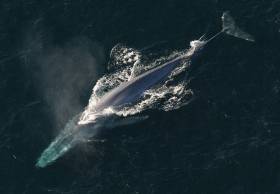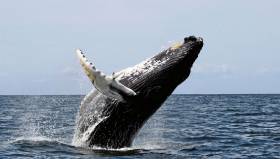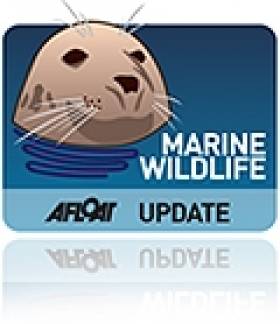Displaying items by tag: Blue Whales
A recent rare sighting of a blue whale off the west of Ireland is the first in six years, it’s been reported.
Last weekend the Irish Whale and Dolphin Group (IWDG) shared an image of what’s believed to be a blue whale surfacing, as captured by Declan Horan from the the RV Celtic Explorer some 320km west of Slyne Head.
“Although we know from acoustic monitoring during the ObSERVE acoustic project that blue whales occur regularly along the western seaboard during autumn and winter, they are very rarely observed,” the IWDG said.
The Irish Mirror reports that this is the first confirmed sighting of a blue whale in Irish waters in six years — and only the 18th recorded since 2008.
London Museum’s Wexford Blue Whale Skeleton Is The Real Deal
#MarineWildlife - The skeleton of a blue whale beached on the Wexford coast in the late 19th century has now taken pride of place at London’s Natural History Museum.
As previously reported on Afloat.ie, the museum paid the equivalent of €30,000 for the carcass of the giant marine mammal that washed up in Wexford Harbour in 1891.
The specimen was subsequently rendered at the museum’s own ‘whale pit’, which operated till the 1940s, and its skeleton was put into storage for decades.
That’s until the museum’s directors decided that a new display in its grand entrance hall would help reposition the institution as one that puts first the conservation of today’s natural world, according to the Guardian.
In short, that meant saying goodbye to Dippy, the famous diplodocus skeleton that is actually a cast of a dinosaur fossil found in the United States — and welcoming a more local but more importantly awe-inspiring and authentic example of life that exists on this planet today.
Hanging the new attraction was no mean feat, however, as The Telegraph reports how a crucial bolt was sheared off in the middle of hoisting the 4.5 tonne beast in the museum’s Hintze Hall.
Whale Watchers Claim First Irish Humpback Sighting Of 2017
#MarineWildlife - Whale watchers off the Sunny South East believed they’ve photographed Ireland’s first humpback whale sighting of 2017, as TheJournal.ie reports.
South Coast Charter Angling skipper Martin Colfer was out with photographer Myles Carroll yesterday (Wednesday 4 January) when they caught a glimpse of the tail fin of the 13-metre-long marine mammal as it slinked back under the surface.
In other Irish whale news, The Times says work has begun on removing the famous diplodocus skeleton replica from London’s Natural History Museum to make way for a blue whale found in Wexford more than a century ago.
As previously reported on Afloat.ie, the whale specimen has been in the museum’s collection since it washed up at Wexford Harbour in 1891, and will now take pride of place in the central that Dippy previously called home since 1905.
Meanwhile, the world’s oldest killer whale is presumed dead after researchers lost track of her movements some months ago, according to the Guardian.
Believed to be 105 years old, ‘Granny’ was the matriarch of a small and endangered group of orcas in Puget Sound, north of Seattle in the north-west United States.
“With regret we now consider her deceased,” researcher Ken Balcomb, who has tracked Granny and her fellow orcas over four decades.
The genetically unique population bares comparison with the distinctive orca pod that splits its time between Ireland and Scotland, and which has faced its own challenges in recent years.
#MarineWildlife - The Irish Whale and Dolphin Group (IWDG) has proposed a restriction of seismic survey activity on the slopes of the Irish continental shelf and the Porcupine Seablight.
The IWDG says its move "stems from an increasing body of evidence which indicates that the Irish Shelf Slopes and Porcupine Seablight are an important migration route and opportunistic foraging area for blue whales and fin whales from August to March each year.
"Humpback whales are also known to migrate along a similar route in the winter and early spring," it added in a statement.
The cetacean conservation charity as expressed concern at what it perceives as "a large increase in seismic survey activity in the Porpcupine Seablight during the main migration period and recent evidence of disturbance to these migrating whales by seismic surveys."
As a result, the IWDG has proposed to the Petroleum Affairs Division of the Department of Natural Resources that seismic surveys – such as that scheduled to be conducted in the Porcupine Basin this September – be "restricted to the months March to August, outside of the migration period, in order to minimise disturbance to these highly endangered whale species."
According to the group "similar measures" have been successful in other parts of the world, such as off South Africa, where whales "seasonally occur in large numbers".
The IWDG's proposal is available as a PDF to download HERE.
































































